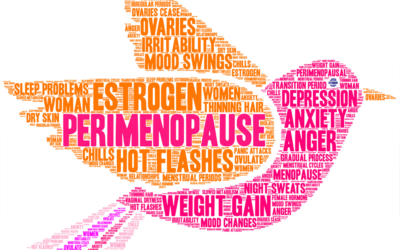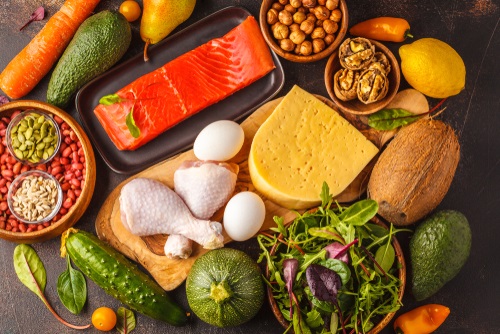

Are You Navigating the Symptoms of Perimenopause?

When I was in my mid-forties I started experiencing a number of seemingly unrelated symptoms – weight gain, brain fog, sore joints, and fatigue. I tried all sorts of one-off fixes – diets, exercise programs, and magic pills – without success. It wasn’t until my period started changing and I experienced hot flashes that the penny dropped and I connected everything to perimenopause. Did it happen like that for you too?
I wonder why there isn’t more talk about perimenopause? After all, it happens to all ladies, although it’s true that some have more challenges with it than others.
Perimenopause (and menopause) is the bookend to puberty, the reproductive part of our lives. So it includes a lot of hormone changes as the reproductive hormones – primarily estrogen and progesterone – naturally decline.
But the real challenge comes with how those changes impact our wellbeing. Like mood swings, inability to sleep, extreme fatigue, joint pain, digestive issues, hot flashes, night sweats, low sex drive and weight gain. What’s up with all that? Why can’t we just wind up our periods and call it a day?
There are two paths for getting help with perimenopause. The medical path and the lifestyle path. Unfortunately, many doctors are not well equipped to help. The American Association of Retired Persons reports most medical schools and residency programs don’t teach physicians in training about menopause. To make matters worse, a recent survey found that just 20% of ob-gyn residency programs provide any kind of menopause training.
When asked, 3 out of 4 ladies reported they did not get adequate treatment when they brought perimenopausal and menopausal concerns to their doctors. And 84% of women say their symptoms interfere with their lives and some are even debilitating.
One of the main areas where doctors should be able to help is in prescribing Hormone Replacement Therapy (HRT). Even though treatment has changed dramatically over the past decade, many doctors are unaware. The new body identical treatment is administered in patches or gel and poses none of the earlier health concerns for breast cancer and heart disease. The topical delivery method means that the liver is completely bypassed, and that absorption through the skin dramatically changes the health risks. Dr. Louise Newson, The Menopause Doctor, goes so far as to encourage women to consider taking body identical HRT for the protections it provides against heart disease, osteoporosis, diabetes and Alzheimer’s.
The other path to get help with the symptoms of perimenopause is through lifestyle. There is a lot that lifestyle habits and behaviors can do to demystify the changes. It turns out the healthy practices of diet and exercise that ladies maintained before perimenopause are unlikely to suit them very well once they enter perimenopause. As our nutrition needs change, so does our digestion. We no longer need all the protein we used to eat, and our sensitivity to sugar and processed foods heightens. Bloating, brain fog, joint pain and weight gain result.
And with hormonal changes to our muscles and joints, the type of exercise and movement that is beneficial also changes. Even if you have always been athletically active, the fatigue and joint pain can make ambitious workouts very difficult. In fact, high impact and anaerobic exercise can cause stress to the system and result in the production of cortisol, the stress hormone. The timing and type of movement you choose take on new importance.
Hormonal changes impact sleep, especially when combined with food choices and stress. So figuring out new sleep hygiene habits are vital to being able to restore the body each night with quality sleep. As we sleep, the body is busy removing dead cells burning fat and rebuilding tissue. The brain catalogues the day’s experiences and builds up memories. Without adequate sleep, the body is stressed when it cannot carry out these maintenance functions and produces cortisol in response. That in turn stimulates appetite, which produces more insulin leading to fat production (and stubbornly stored around the middle). So getting enough good sleep is vital to being able to adapt through the changes of perimenopause.
And finally, mindfulness – getting your head in the game is so important. As it happens, the mind can only focus on one thing at a time. So if you control some of the things you tell yourself and make them positive things, you will benefit from that. Rather than tell yourself that you’re a lazy slob or beat yourself up because you don’t have enough willpower, you tell yourself that you’re an intelligent woman and the goal is achievable. Meditation is a great way to calm the mind, focus on positive things and create endorphins. This can really help to create positivity, reduce cortisol levels and help with sleep.
Are you satisfied with the support your doctor has been giving you for the symptoms of perimenopause? Some symptoms are best resolved using HRT. But many more can be resolved by taking a lifestyle approach.
The beginning of my perimenopausal journey didn’t go well, and I’m determined to help ladies navigate this chapter of their lives so they can take control of the next decades and live their best lives.
To find out how you can navigate the symptoms of perimenopause, click the button to book your free call with Dyna Vink, Health and Nutritional Coach.
WHAT FOODS CAN YOU EAT ON A LOW CARB FOOD PLAN?
Proteins (20%)
We recommend eating between 3 and 6 oz of protein a day. It’s not difficult to eat that in one meal, so you may need to plan it out if you want to spread it over two or three meals.
● Fish and Shellfish: wild is better than farmed, and low mercury is best. Salmon, tuna, halibut, sole, trout, sardines, and flounder are all good choices. For shellfish, you can choose clams, scallops, oysters, shrimp, squid, and crab.
● Poultry: Free run is best – chicken, duck, turkey, cornish hen, and eggs are all good choices.
● Meat: Grass-fed organic is best. Beef, pork, lamb, bison and venison are all good choices.
● Dairy: Grass-fed organic is best. Very small amounts. Some Greek yoghurt, grass fed butter, small amounts of hard cheese.
● Nuts and seeds: Whole and raw is best, but roasted can be okay. Great choices include walnuts, almonds, and pecans. Seed choices include flax, chia, hemp, and pine nuts.
Vegetables / Fruits (45%)
Vegetables and fruits provide excellent nutrients for your body, as well as fiber to keep you regular. We encourage eating a lot of vegetables and daily fruits to support your body’s requirements.
Let’s start with raw vegetables:
● Avocado
● Cabbage, red, green, Chinese
● Celery
● Cucumber
● Lettuce and spinach
● Olives
● All colors of peppers
● Tomato
Cooked vegetables:
● Broccoli
● Beets
● Green beans
● Brussel sprouts
● Fennel
● Cauliflower
● Collards Greens, Chard and Kale
● Eggplant
● Mushrooms
● Onion, leeks and garlic
● Snow peas
● Sweet potato
● Carrots and parsnips
● Zucchini
Fruits: (organic is best)
● Apple
● Berries
● Orange
● Banana
● Kiwi
● Melon
● Pear
● Peach and nectarine
● Plum
● Grapes and raisons
● Lemon and lime
Fat (35%)
Fat is what makes food taste great. It also contributes to satiety, but not every fat is recommended. Trans fats should be avoided altogether. These are found in pre-processed foods, cookies and other products with a long shelf life. The best fats are unsaturated fats:
● Extra virgin olive oil (good for cooking and salads)
● Avocado oil
● Pure coconut oil
● Almond oil
● Macadamia nut oil
● Omega-3 oil found in salmon, seeds and eggs
Drinks:
There are several beverages you are encouraged to drink. We encourage drinking 8-12 cups of fluid per day to keep muscles, digestion and skin hydrated.
● Water, flat or sparkling
● Coffee, decaffeinated is best
● Tea – green, black or otherwise
● Nut-milks, unsweetened
To set yourself up for success, it’s recommended to clean out the cupboards, pantry, fridge, and freezer of processed foods. So what are the foods are you clearing out?
●Packaged food: These are processed foods and they are full of unwanted ingredients. This includes pasta, bread, bagels, pretzels, chips, cereals, cookies, frozen dinners, or ice cream.
● Wheat: Get rid of flour, corn, popcorn, white rice, pasta, cake mixes…
● Unhealthy oils and fats: This includes margarine, soybean oil, sunflower oil, canola, cottonseed oil, corn oil, grapeseed oil, or safflower oil.
● Canned goods: Most canned fruits or vegetables include BPA (or Bisphenol A) which interferes with our hormones.
● Sugar and artificial sweeteners: The best sweeteners include stevia, monk fruit, or sweet alcohols (like erythritol and xylitol) because they do not spike insulin.
● Dairy: All dairy except hard cheeses, heavy whipping cream, cream cheese, and grass-fed butter, need to go. When purchasing dairy, it’s best to purchase organic and to only eat it once or twice a week. Dairy is inflammatory to many people who don’t realize until they remove it.
● Low-fat foods: Anything low fat is overly processed and contain ingredients that are not recommended.
● Sauces and condiments: Most sauces like ketchup are chock full of sugar so it’s best to steer clear of them. Herbs and spices are fine. You can make your own that is low carb friendly.
● Beverages: clear out all sodas, sports drinks, premixed smoothies, fruit juice and drinks with artificial sweeteners.
● Dried fruit, chocolate, and candy: A small amount of dried fruit is okay when added to a salad or recipe, but not as a snack. Stevia sweetened chocolate that is okay, but others should be removed.
Sweets:
It’s true that many people have a sweet tooth and crave sweets. Luckily, this will wear off after as little as a week of “clean eating”. But it’s still nice once in a while to enjoy a sweet treat. There are some options that you can make using coconut and almond flour, grass fed butter and monk fruit and stevia.
The quality of your chosen foods will make a difference in how you respond to the low carb way of life. The higher the quality, the better you will feel, and if it’s your goal, it will support weight loss. As we age, it becomes more important to eat to support our hormones and changing body. The low carb Mediterranean way of eating is a lifestyle approach that is delicious and sustainable.

Holistic Nutrition Lifestyle | Copyright © 2025 | All Rights Reserved
“This site is not a part of the Facebook website or Facebook Inc. Additionally, this site is NOT
endorsed by Facebook in any way.
FACEBOOK is a trademark of FACEBOOK, Inc.”
